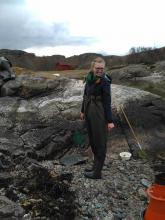I am a UNCW student studying the relationship between sponges and algae throughout the mesophotic zone in Caribbean coral reefs. This honors project is through Dr. Pawlik’s chemical ecology lab at the center for marine science. The day to day of my project consists of analyzing photoquadrats from images taken by ROV (remotely operated underwater dive vehicle) dives throughout the Caribbean coral reefs. This analysis is to determine the percent cover of sponges and algae at different depths, and to determine sponge biomass based on thickness. This research is supported by the Pawlik lab because it is testing the hypothesis that sponges and algae have a positive ecological feedback loop. This research is based on emission of dissolved inorganic nitrogen by sponges and production of dissolved organic carbon in algal communities. This research is important because it aids in the understanding of benthic organism interactions and reef ecosystems in the Caribbean.
I originally got involved with this research project through a directed independent study (DIS) opportunity with the chemical ecology lab. I completed the DIS and then approached Dr. Pawik about completing a departmental honors project after I had completed my DIS. I hope to gain valuable technical skills in image analysis and a familiarity with the Caribbean coral reef ecosystem functions. I feel passionately about the research I am conducting and am intrigued by the scientific process of research. Coral reef ecology is a growing field in marine biology, I think that my experience working in this ecological niche will aid my future career goals of research in marine ecosystems.
I gained many skills from this project, primarily skills in presenting at scientific conferences, creating scientific posters, and image analysis for Caribbean coral reefs. The project is challenging, but in a constructive way! It is difficult and fun to design a research question and implement data analysis techniques to understand a key component of a unique environment.
I think there are many graduate programs that give preference to people with applied learning experience. It will help me immensely in the future because it has given me technical experience, a look into the world of research, invaluable contacts in the field, and a meaningful experience to put on my resume when applying for programs. I am now a more marketable employee, student, and scholar.





